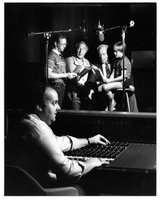
I thought I might regret it, but I paid good money for a copy of that unauthorised biography:
Ray Bradbury Uncensored! The Unauthorized Biography, by Gene Beley. As I have mentioned before, I had concerns that this would not be a very solid piece of writing.
At some point, I will do a complete review of the book, but I wanted here to record my first responses, having speed-read the whole book, and having read a couple of chapters very closely.
My overall impression is of a book that very much needs a strong editorial hand. It needs some fact-checking (example: it reports events of Bradbury's 86th birthday, even though it was published
before
that event). It needs some copy-editing (example: names of people spelled inconsistenly, sometimes within a single paragraph).
It also needs systematically revising to make it a 2006 book, rather than a slowly-accreted collection of items written over a period of years. It is rather disturbing to read that Beley had "last heard of" Charles Rome Smith in a particular place - giving the impression that the author has lost track of the theatre director - and then to read an end-of-chapter note reporting Smith's death. Many of the chapters of the book take the form of an article written ten, twenty or thirty years ago, with an "author's note" tacked on the end to bring it up to date. In chapters where Beley is reporting a specific event, such as a particular speech Bradbury delivered, this would appropriately give us a sense of being at the event, and provide important historical context. However, when the chapter is an interview that has no particular point-in-time value, this seems odd. George Clayton Johnson and Harlan Ellison, both very much alive today and (judging from interviews elsewhere) both highly accessible to interviewers, are quoted extensively on their views of Bradbury's writing and character - but the interview quotes are from the 1980s. Ellison is quoted as saying that Bradbury has done nothing of value for thirty years - but this quote pre-dates Bradbury's flurry of writing activity that would include
Death is a Lonely Business
,
Green Shadow White Whale
,
Ray Bradbury Theater
,
The Toynbee Convector
...
Apart from these editorial weaknesses, does the book have anything to offer? Well, it has a biography of Bradbury, but necessarily with less detail than Sam Weller's
The Bradbury Chroniclesoffers. It reports on some of Bradbury's public speaking, quite successfully giving a sense of what it is/was like to be present at such events. It covers Bradbury's legal action against CBS over copyright infringement of
Fahrenheit 451
, in more detail than I have read elsewhere. It gives some insights into Bradbury's forays into theatre, revealing/claiming clashes between Bradbury and Smith, and between Bradbury and Shank.
It has some charming quotes from "ordinary people" who knew Ray at various points in his life, and some negative comments about Bradbury from various people who have had dealings with him.
And it sounds slightly unkind when discussing Bradbury's disabilities and his current state of health.
And quite a few photos, rather randomly arranged.
Overall, it's a real mixed bag. Probably essential reading for the Bradbury completist, but for anyone else I would say: buy Weller instead.
My top tip is to buy the ebook version, which is a lot cheaper than the printed edition!


